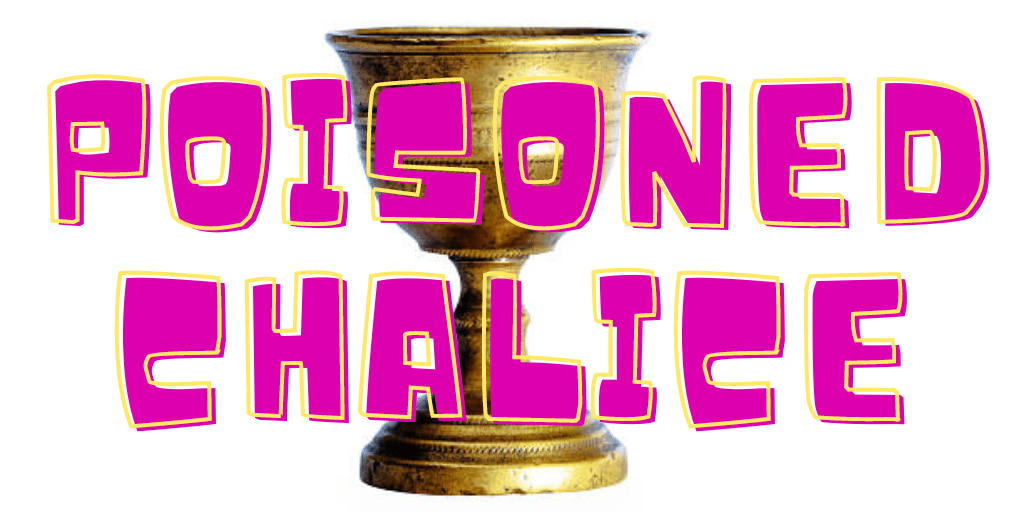The idiom “poisoned chalice” refers to a gift or opportunity that appears beneficial but is, in reality, damaging or detrimental. It symbolizes a seemingly advantageous situation that harbours concealed risks or undesirable consequences. This metaphorical expression suggests that accepting the “chalice” may lead to unforeseen problems or difficulties, akin to ingesting a toxic substance.
Origin of “Poisoned Chalice” – Macbeth’s Ambition and Betrayal
The phrase “poisoned chalice” originates from William Shakespeare’s play “Macbeth”. In Act 1, Scene 7, Macbeth contemplates the consequences of assassinating King Duncan to fulfil his ambitious desire for the throne. He metaphorically likens the act to a “poisoned chalice” that will return to haunt its giver, symbolizing the treacherous nature of the regicidal ambition.
Macbeth reflects on the ramifications of his actions, contemplating the metaphor in the following lines:
“But in these cases
We still have judgement here, that we but teach
Bloody instructions which, being taught, return
To plague th’inventor. This even-handed justice
Commends th’ingredience of our poisoned chalice
To our own lips.”
This soliloquy showcases Macbeth’s internal struggle, recognizing the moral and political implications of his ambition. The “poisoned chalice” metaphor emphasizes that the apparent gains from his actions will be tainted with unforeseen, destructive consequences.
The context of this idiom within Macbeth underlines themes of ambition, betrayal, and the inevitable repercussions of immoral choices. The chalice represents not only the act of regicide but also the subsequent consequences that will befall Macbeth.

Poisoned chalice
“Poisoned Chalice” in Other Media
The idiom “poisoned chalice” has permeated various forms of media, including literature, films, and titles. In the film “The Poisoned Chalice” (1920), the idiom is utilized to convey a sense of impending danger and the deceptive nature of seemingly favourable situations. Similarly, the book “The Poisoned Chalice” by Bernard Knight uses the phrase to evoke intrigue and foreshadowing within its mystery narrative.
One notable reference in modern literature is J.K. Rowling’s “Harry Potter and the Half-Blood Prince,” where the concept of a “poisoned chalice” is metaphorically employed to describe a perilous situation with hidden dangers.
In films like “The Poisoned Chalice” (2008) and “A Poisoned Chalice” (2013), the idiom is invoked to underscore themes of betrayal, moral ambiguity, and the unintended consequences of characters’ actions.
The recurring use of the phrase in various media reflects its enduring relevance in portraying narratives of unforeseen repercussions and the deceptive nature of apparent opportunities.
How to Use “Poisoned Chalice” in Sentences
- Accepting the promotion seemed like a poisoned chalice when the company faced financial collapse soon after.
- The new political leader inherited a poisoned chalice, grappling with a myriad of problems left by the previous administration.
- Marriage, once seen as a solution to loneliness, turned out to be a poisoned chalice when the couple realized they were incompatible.
- The seemingly generous offer to lead the project turned out to be a poisoned chalice, as it came with unrealistic expectations and a tight deadline.
- Investing in the stock market without proper research can be akin to drinking from a poisoned chalice, as one might face significant financial losses.
Synonyms for “Poisoned Chalice”
- Trojan Horse: A deceptive gift or strategy that conceals a threat or danger.
- Double-Edged Sword: A situation or decision with both positive and negative consequences.
- Mixed Blessing: A situation that has both advantages and disadvantages.
- Pandora’s Box: A source of unpredictable troubles or difficulties.
- Faustian Bargain: A deal or agreement that yields short-term benefits but entails severe long-term consequences.
Anonyms for “Poisoned Chalice”
- Boon: A beneficial or advantageous situation.
- Blessing: A gift or opportunity that brings positive outcomes.
- Windfall: An unexpected financial gain or stroke of luck.
- Advantage: A favorable or superior circumstance.
- Benediction: A blessing or expression of good wishes.




Leave a Reply
Want to join the discussion?Feel free to contribute!